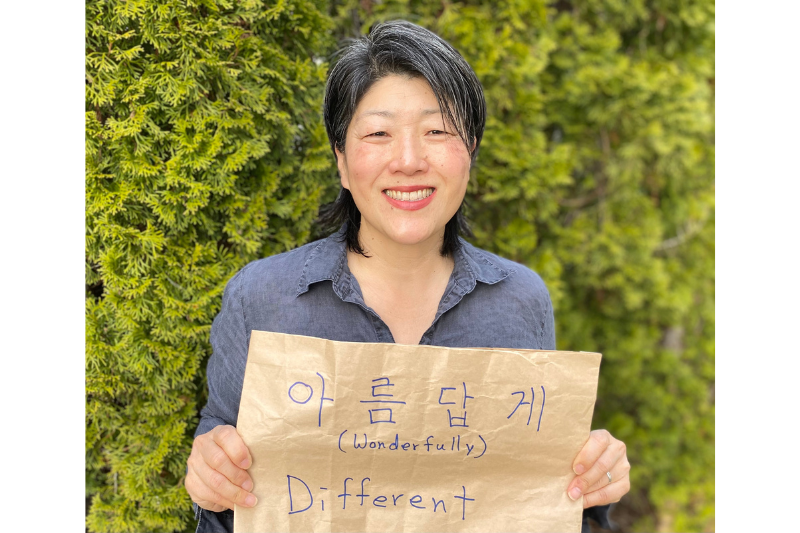2023 Lent Devotional-Week 7
아름답게 다를
(Korean translation of “wonderfully different” in English)
Contrast/Connect between John 3:1-17 (Nicodemus) and John 4:5-42 (Woman of Samaria)
By Rev. Wongee Joh (she/her/hers)
I am a Korean American woman not generally included either as Asian or specifically Korean-American in the acronym BIPOC, an ordained elder clergy in the UMC still part of the dominant Christian religion in the US, cis-gender, heterosexual, married, middle age, double income, child of immigrants without inheritance of wealth from land appreciation, educated with a graduate degree, first generation with a college degree received in the United States, and without specific needs for visual and or audio accessibility as just one aspect of my physical privileges.
So, I checked off some boxes for privileges that I have as part of my identity, shared about some identities of myself that place me into margins created by dominant groups with power, and also shared about some hidden and less visible privileges and/or margins at a round table with other clergy and laity from the PNW (Pacific Northwest) conference’s hybrid regathering of RMN (Reconciling Ministries Network) this month. The entire video of the presentation and specifically around intersectionality is now available here at this link- https://www.youtube.com/watch?v=A0DyE-YVNTA . Our presenter was Rev. Dr. Israel Alvaran who claimed himself as “wonderfully different” which inspired me to preach the following two Sundays in lent (stories of Nicodemus and the woman from Samaria from the Gospel of John) using the perspective and lens of intersectionality.
The word “wonderfully different” is one of those descriptions that holds tensions of perceived contrasts and is able to hold a wholeness that breaks down binaries that is often easy to trap ourselves into. Like in the story of Nicodemus who comes to Jesus in the shadows of night, might he/we be able to see God Incarnate, Jesus, as “Luminous Darkness” or in poet Vaughn’s words, like the “dazzling darkness” And, in the story of the woman of Samaria whom Jesus meets at the well with an invitation to springs of eternal life and never thirsting again, the revelation of God the Gushing Rock. I could identify God as Wonderfully Different because whenever I have a revelatory experience, a God moment of awe, it feels “wonderfully different.” It is wonderfully different to see with a new perspective and new lens where I can feel the love of God, the love of self, and the love of others, refreshed and becoming a transformative agent. What do we think of God as Wonderfully Different in this season of lent?
Rev. Alvaran also wore a T-shirt with the words, “You belong” and metaphorically can we just imagine Jesus wearing such a T-shirt in his encounter with the woman at the well, as well as the woman wearing that kind of t-shirt back into her town? What I love about the woman of Samaria is her courage, audacity, resilience, and vulnerability (she tells her truth) to listen to a stranger/outsider with more privilege and more power than herself. Maybe the truth of their intersectional lives, both marginalized as persons living under the colonization of the Roman Empire connected them. In spite of and more accurately maybe because of both being tired of their shared marginalization, they are able to empower each other to become agents of transformation and change. She becomes a witness, going to invite others with greater privileges than herself as well as shared margins, to build a community of belonging from the outside in and not the usual way of the insiders becoming inclusive and receiving her. It is more common today for people like her to be included, usually as individuals, at a time as part of the status quo order. The status quo order, more often than not, will hold marginalized persons as perceived token representatives as the margins decrease, trickle by trickle towards equal justice that equity remains absent. Personally, it has been my experience that full inclusion of any kind is too slow, and if we wait to be included, realistically it may not be possible. In my tired days, I wonder if privilege plus power (discrimination) in one form or another is even possible to dismantle completely. I do find hope in the wonderfully different stories of Jesus and this woman of Samaria, facing multiple discriminations becoming the change agent sent to share the good news to those who consider her in her own town the other. And most exciting is to see how though Jesus himself was also tired on his journey that he too is empowered by the woman to live into his identity as Wonderfully Different, being and doing the will of God (John:4:34)
As a person serving in cross-cultural and cross-racial appointments, it has been challenging to offer interpretations of scripture through the lens of intersectionality, and it will not be enough to do that work alone. It is challenging like holding the tension of contrasts between the characters Nicodemus and the woman of Samaria to deepen our understanding of the connection between both persons. One shared connection between the two characters and stories is the fleshing out of Jesus as the Savior of the world (John 3:16 and John 4:42) from one story to the other. For the first time in reading commentaries about “For God so loved the world…” as part of the story of Nicodemus in verse John 3:16, I read about a new translation for the word “believe.” I read in “Feasting on the Word” (commentary for Year A, Vol. 2) that according to historian Diana Butler Bass, in her book, “Christianity after Religion” the English word “believe” comes from the German word “belieben.” I had to remind our church friends that our English translation of the bible is a version translated historically from sources written in Hebrew, Greek, then translated into Latin, then into German by Martin Luther, and then into many languages including English and Korean. I have to reiterate this from time to time because though my local congregation as predominantly non-Korean and progressive knows in their heads that the bible did not drop out of the heavens and Jesus did not pray for example the prayer he taught his disciples literally in the English language, I often encounter that in some persons’ practices the Word made Flesh, the Bread of Life, and the Living Word, is not alive in the heart. God is more inorganic than organic.
Anyways, the English translation for the word “believe” has its roots in the German word for “belieben” and that German word can also be translated as the word for love, according to Diana Butler Bass. Now that was a moment of “dazzling darkness” that can be blinding for an awe some moment. It feels so different to hear these words with that new translation, “For God so loved the world as to give the Only Begotten One, that whoever believes, (bilieben, loves) may not die, but have eternal life.” (Inclusive Bible translation). In the NRSV version, “For God so loved the world that he gave his only Son, so that everyone who believes, (bilieben, loves) in him, may not perish but have eternal life. And in the Korean-English translated New International version, “ 하나님이 세상을 이처럼 사랑하사 독생자를 주셨으니 이는 저를믿는 자마다 멸망치 않고 영생을 얻게 하려 하심이니라” (insert love, 사랑하는 for 믿는)
What I most appreciated from both my participation at the Regathering of RMN as well as through preaching on these readings in John chapters 3-4, was remembering what our new bishop for the GNW conference, bishop Cedric Bridgeforth shared, that none of us should be forced to choose one aspect of ourselves over another. Nicodemus struggles with his different identities of privilege and desiring wellness in his whole being, the woman of Samaria remembers for us, God’s own rejoicing whenever God’s beloveds rise up to live into our whole, honest, and true selves. Women have throughout history like this woman of Samaria been recipients of the gift of God and full participants as agents of change with Jesus in doing the will of God.
During this season of lent, I invite us to reflect on relationships of who we are in our intersectionality, where we may be defined by our margins and or as those who define those margins. The woman of Samaria witnesses to us that we belong precisely because we are wonderfully different and that God in Christ, our Wonderfully Different invites us to become agents of change for the wholeness of our cosmos. (John 3:16) Let us rise and continue with Wonderfully Different all the way to Jerusalem as people of the resurrection.
You make our collective work possible by your witness for justice every day in your church, community, and Annual Conference. MFSA does not receive any financial support from the United Methodist Church's giving channels. 100% of our budget is funded through your membership dues and your generosity in giving.
Rev. Wongee Joh (she/her/hers) is an ordained elder serving in the Pacific Northwest Conference (PNW). She was ordained in 2014 as a member of the New York Annual Conference and was the recipient of MFSA’s Gwen and C. Dale White Award, “For tireless work for justice and reconciliation in time of bitter conflict around race, gender and human sexuality.” She served as associate chaplain in the Spiritual Care Department of Vassar Brothers Medical Center for 6 years. She enjoyed her experience as an adjunct professor for Leadership and Formation at Drew Theological School teaching hybrid, both online and in person before it became a new normal in and through the pandemic. Before responding to her call to ordained ministry she was one of the founding members of Vermont Korean-American UMC. She felt she came home full circle when she midwifed HA:N UMC, one of the first inclusive and welcoming Korean UMC in the US. She currently enjoys backpacking with her spouse in the national wilderness forests of the PNW.

